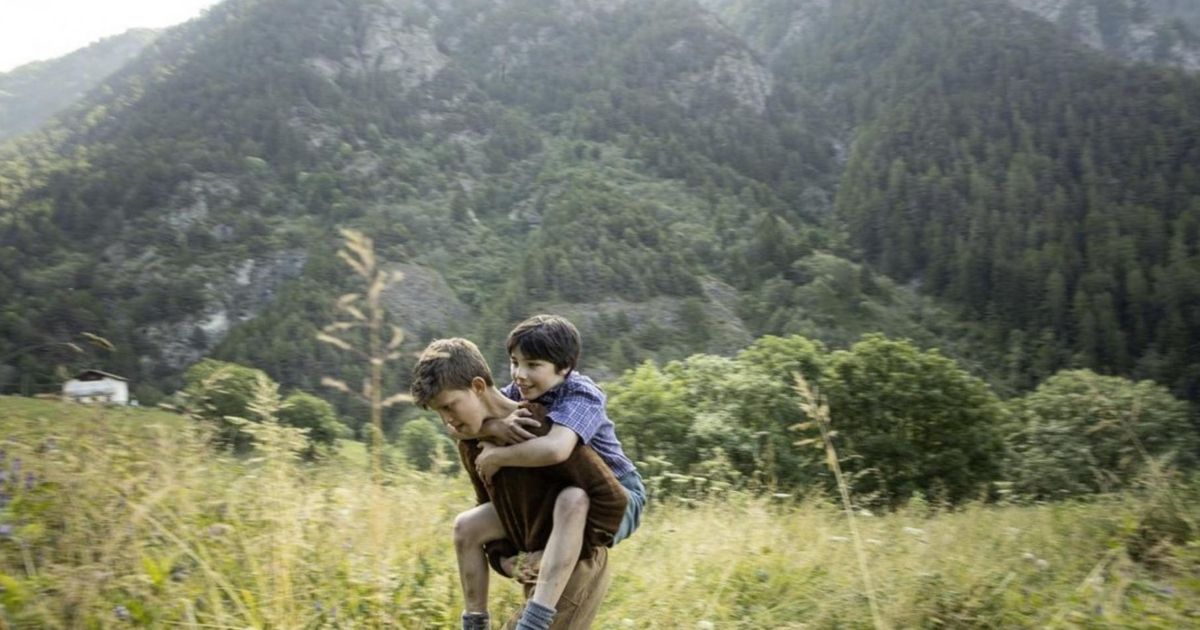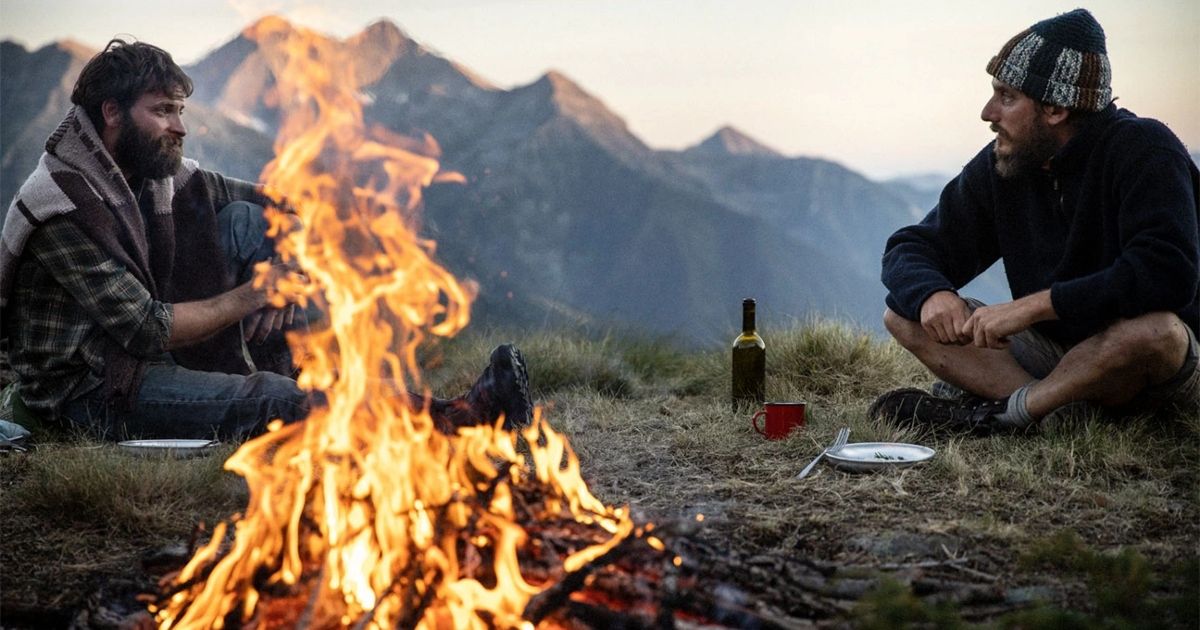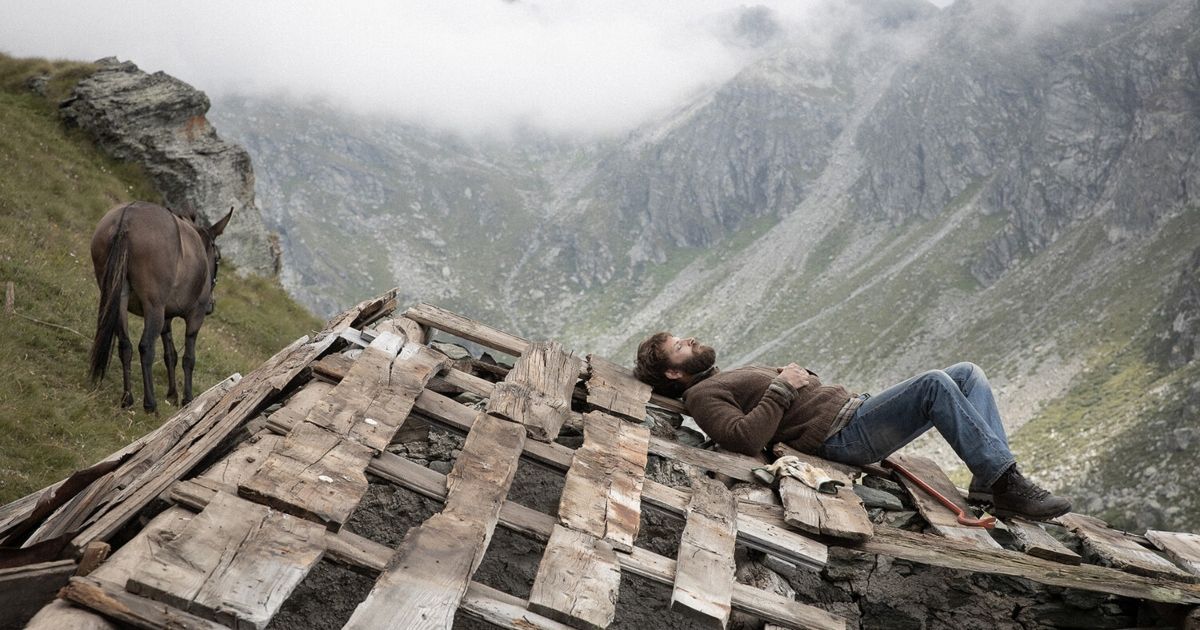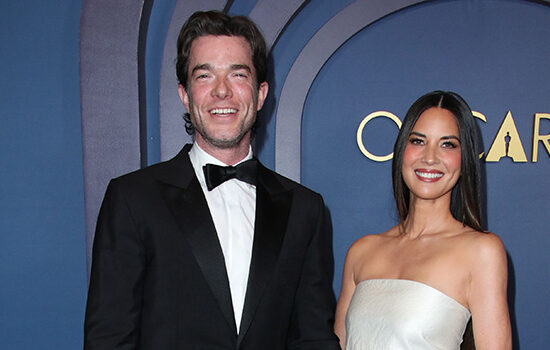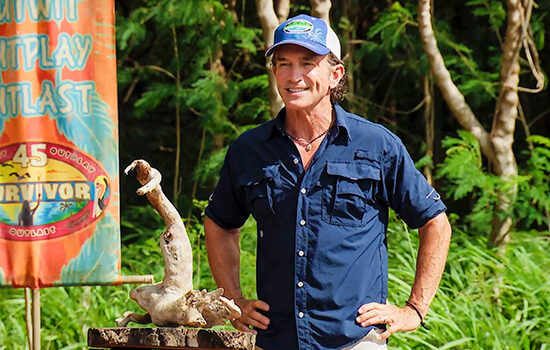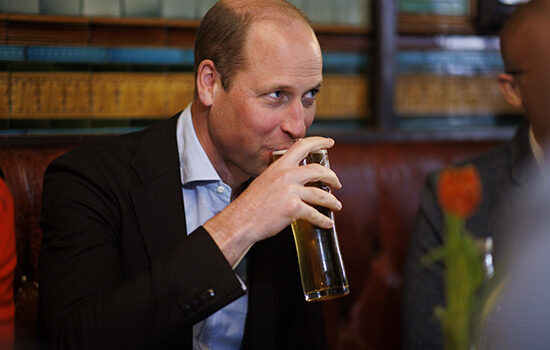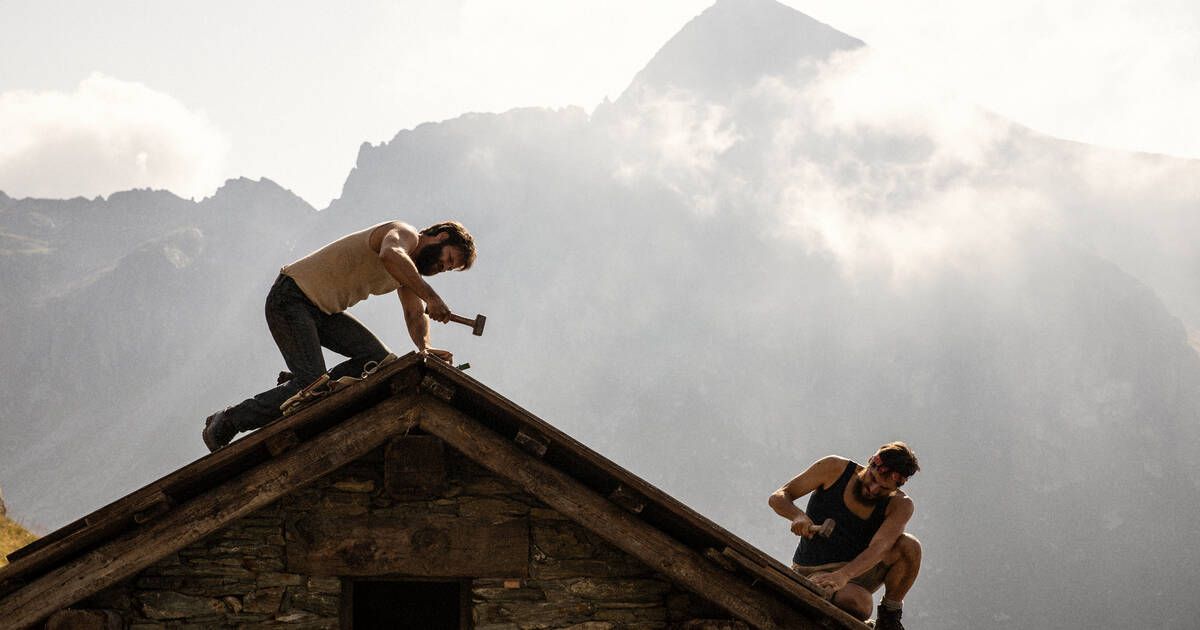
Much like the glacier explored in The Eight Mountains, the movie holds onto a lifetime of memories, mythologizing each moment as it happens. Written and directed by the husband and wife duo of Felix van Groeningen (Beautiful Boy) and Charlotte Vandermeersch, there is a palpable sense of the love channeled into this project which began after a troubled period of their relationship. With the first draft of the screenplay being completed in the spring of 2020, it’s no surprise that they were drawn to such an expansive and nature-based story after being cooped up at home.
Based on the beautiful and concisely written novel of the same name by Paolo Cognetti, The Eight Mountains (which won the Jury Prize at Cannes) follows the life of Pietro Guasti, primarily played by Luca Marinelli, from the age of 11 through the following decades. We first meet Pietro when his parents — Francesca and Giovanni, played by Elena Liett and Filippo Timi, respectively — take him to a tiny Alpine village for the summer. This is where he meets Bruno Guglielmina, whose adult self is portrayed by Alessandro Borghi, and the trajectory of his life is irrevocably altered.
A Friendship Forged in Nature
Being the only two children in Grana, the village in which Bruno lives and Pietro visits, the bond between the pair may seem inevitable, but its longevity goes beyond a mere friendship of convenience. Describing the isolation he experiences in the town, Bruno tells Pietro, “They built a road to attract more people to Grana, you know what happened instead? They all went away.”
So, with the arrival of another boy his age, how could he not seek out a friendship? What solidifies their connection is when Giovanni begins to take them on stunning hikes up the surrounding peaks, and pivotally, a glacier. On the glacial hike, the three reach a crevasse which Giovanni and Bruno are able to cross, but Pietro cannot.
As time passes, the rift between Pietro and his father deepens while Bruno and Giovanni become closer. Following a 15-year break between Pietro and Bruno in which they have zero contact, an unexpected event brings them back together. Now, as adults, they build an alpine cabin together where they will continue to meet in the summers to come. The movie gently traverses ideas of dreams, masculinity, and nature vs society in a series of hikes, conversations, and projects. Its loose structure is apt and allows the narrative to swing from year to year without feeling disjointed.
The Battle Between Urbanism and Ruralism
The conflict between a picturesque life in the mountains — working with animals and the land — and the looming necessity of returning to the city for education, business, or social connection is central to The Eight Mountains. Pietro, born and raised at a lower altitude, feels the responsibility to have a more normal life. He bounces from one unfulfilling job to the next, all the while waiting for his chance to return to his mountain retreat. Bruno, on the other hand, cannot visualize a life outside what he knows, which is making cheese and bathing in streams.
Although each envies the other for what they feel they lack, the reality is that they are both left stunted by their relationship with the mountains. For Pietro, his dreams seem unattainable because of his deep belief that a life on the mountain is unsustainable. It’s not until he is encouraged by Bruno, who represents this ideal, that he is able to find a true purpose in his work. In contrast, Bruno’s restrictive way of living has its own consequences. He discusses how the way to express sadness in his regional dialect was by saying “it seems long,” and that he hadn’t thought there were other ways to express emotions, “poor words, poor thoughts.” Yet despite this revelation, he remains stoic in the face of turbulence.
This push and pull between the two men and their beautiful but restrictive surroundings is visualized through the movie’s 1.33:1 aspect ratio. While we are presented with indescribably stunning scenery, the aspect ratio denies us the sweeping, wide views that audiences have come to expect. By confining the visuals in this way, a strong and intimate sense of place is created, but this comes at the price of expanse and freedom.
Additionally, it helps to position the movie in its 1980s (to begin with) setting when the aspect ratio was more widely used. This detail from cinematographer Ruben Impens (Black Mirror, Titane) unites the movie’s visual style with its core debate. He does this in a way that is subtle enough to not impede on the action itself but nonetheless shapes how we experience the entire runtime.
The Ebb and Flow of a Meandering Structure
The Eight Mountains has a loose, meandering structure, which is fitting for a movie so largely focused on hiking and conversation. Although this lack of a traditional plot or arc might be off-putting to those accustomed to more rigidly constructed fare, it’s the most appropriate way for this story to be told. In a sense, the narrative feels like a series of vignettes from each season the two friends spend together, or apart. This format gives each moment space to breathe, and allows scenes to flow together with ease.
The unrestricted shape of these scenes makes significant use of moments of silence. Rather than fast-talking dialogue that hurries through important moments so as not to lose the audience’s attention, this script takes its time. From our hectic present-day perspective, this provides a blissful reprieve from our culture of constant contact and notifications. When Pietro and Bruno are hiking we get to experience the sound of nearby animals, their breathing, and the earth beneath their boots. On their first hike together, Bruno starts to speak, but he is swiftly interrupted by Pietro telling him, “We can talk later. Now we can’t. We talk when we stop.” It’s these silences that further our immersion into their remote world.
Where The Eight Mountains’ structure falls short is in its pacing and how it captures the passage of time. The earlier stages of Pietro and Bruno’s lives, as children and adolescents, go by rapidly. As a result of this, the establishment of the complex relationships between Bruno, Pietro, and Pietro’s father is somewhat rushed.
An argument could certainly be made that in the grand scheme of life, these early years do go by quickly and that the movie is reflecting the elusiveness of youth. However, when so much of the movie hinges on the boys’ relationship with the men in their lives, it could have spent more time exploring just that. Especially when considering the filmmakers have 147 minutes at their disposal and a final act that slightly overstays its welcome.
Machismo, Fatherhood, and the Mountain
One of the most refreshing aspects of this movie is its ability to discuss masculinity and fatherhood in a way that feels natural. It avoids falling into the camp of overly graphic critiques, such as The Banshees of Inisherin, that use violent shock tactics to make their point. Instead, it simply presents us with complex dynamics between two men and their fathers. Pietro was ashamed of his father’s lack of social life and dreams, leading him to want freedom and escape. Bruno’s father took him away from his home to work when he was only 13, so as soon as he was able to, he returned to the mountain and never wanted to leave.
Later, there are thoughtful discussions of their fathers’ families and how the different generations have impacted each other. The fact that Pietro and Bruno spend time unpacking these cycles is especially prudent because of Italy’s culture of machismo. While patriarchal ideals and misogyny are prevalent globally, they impact every culture differently. In a voiceover, Pietro says his mother was “used to living among silent men,” and would therefore shoulder the burden of communication for the family. Pietro and Bruno go a long way in improving upon their fathers’ actions, but there remains an inability to communicate in an entirely unguarded way.
As reported by Filmmaker Magazine, a different actor had originally been cast as Giovanni but dropped out due to the filming conditions and had to be replaced last minute. This worked out in the movie’s favor, as Timi did an astonishing job with the relatively few scenes he had. He conveys anger, sadness, strength, and weakness all at once and lays incredible groundwork for the subsequent observations on masculinity throughout the movie. Without his performance as the patriarch, the story wouldn’t begin to flow through various discussions of connections with friends, nature, and the self, inevitably returning to rest on the mountain just as Pietro and Giovanni do.
From Wildside, Rufus, Menuetto, and Pyramide Productions, in collaboration with Elastic Distribution, The Eight Mountains will open in Los Angeles on May 5 courtesy of Vision Distribution, and you can find showtimes and listings here.







